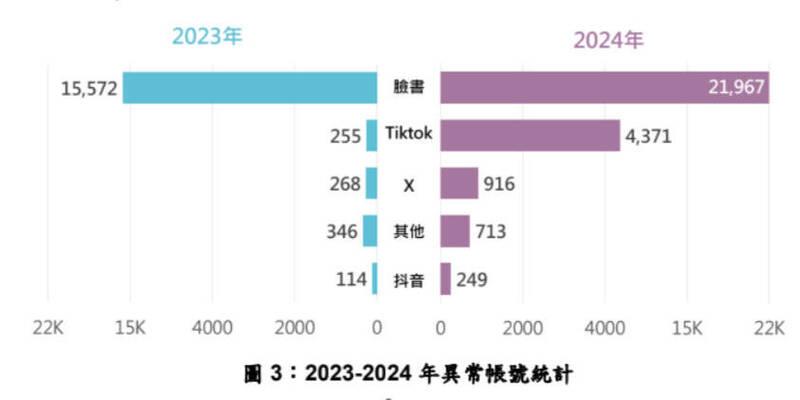The National Security Bureau (NSB) published its analysis of Chinese Communist Party (CCP) disinformation tactics for last year, showing that disinformation doubled when compared to 2023.
CCP disinformation is intended to undermine confidence in Taiwan’s military, US support for Taiwan and President William Lai (賴清德), the NSB said.
In 2024, 2.159 million examples of controversial content believed to be CCP disinformation were reported, the NSB’s data showed, nearly double the 1.329 million seen in 2023.

Photo courtesy of the National Security Bureau
Facebook remained the platform most susceptible to hosting such disinformation, with a 40-percent increase compared to 2023, although there were also major increases in disinformation on video platforms (151 percent), forums (664 percent) and X, formerly Twitter (244 percent), the NSB said.
The NSB also found 28,216 questionable social media accounts, 11,661 more than in 2023.
Facebook had 21,967 of these accounts, but TikTok, X and China’s Douyin (抖音) also saw major increases, the NSB’s data showed.
The NSB report highlighted six key tactics employed by the CCP to interfere with Taiwan: flooding social media with information seeking to influence voter behavior, impersonating Taiwanese users and official accounts, leveraging military exercises for propaganda, posting artificial intelligence-generated “deepfakes” of Taiwanese officials, co-opting integrated media accounts to spread propaganda and establishing fake international news sites to promote the “one China” principle.
The CCP takes advantage of democratic systems to wage cognitive warfare using internet platforms, the NSB said, adding that this is an international concern.
In response, Taiwan has used a comprehensive strategy to combat the threat of disinformation, the NSB said.
The NSB reported 3,900 cases of disinformation to different government agencies and ministries, and Taiwan hosted more than 100 exchange events to share expertise with other countries, the report said.

Chinese Nationalist Party (KMT) Chairman Eric Chu (朱立倫), spokeswoman Yang Chih-yu (楊智伃) and Legislator Hsieh Lung-chieh (謝龍介) would be summoned by police for questioning for leading an illegal assembly on Thursday evening last week, Minister of the Interior Liu Shyh-fang (劉世芳) said today. The three KMT officials led an assembly outside the Taipei City Prosecutors’ Office, a restricted area where public assembly is not allowed, protesting the questioning of several KMT staff and searches of KMT headquarters and offices in a recall petition forgery case. Chu, Yang and Hsieh are all suspected of contravening the Assembly and Parade Act (集會遊行法) by holding

PRAISE: Japanese visitor Takashi Kubota said the Taiwanese temple architecture images showcased in the AI Art Gallery were the most impressive displays he saw Taiwan does not have an official pavilion at the World Expo in Osaka, Japan, because of its diplomatic predicament, but the government-backed Tech World pavilion is drawing interest with its unique recreations of works by Taiwanese artists. The pavilion features an artificial intelligence (AI)-based art gallery showcasing works of famous Taiwanese artists from the Japanese colonial period using innovative technologies. Among its main simulated displays are Eastern gouache paintings by Chen Chin (陳進), Lin Yu-shan (林玉山) and Kuo Hsueh-hu (郭雪湖), who were the three young Taiwanese painters selected for the East Asian Painting exhibition in 1927. Gouache is a water-based

Taiwan would welcome the return of Honduras as a diplomatic ally if its next president decides to make such a move, Minister of Foreign Affairs Lin Chia-lung (林佳龍) said yesterday. “Of course, we would welcome Honduras if they want to restore diplomatic ties with Taiwan after their elections,” Lin said at a meeting of the legislature’s Foreign Affairs and National Defense Committee, when asked to comment on statements made by two of the three Honduran presidential candidates during the presidential campaign in the Central American country. Taiwan is paying close attention to the region as a whole in the wake of a

OFF-TARGET: More than 30,000 participants were expected to take part in the Games next month, but only 6,550 foreign and 19,400 Taiwanese athletes have registered Taipei city councilors yesterday blasted the organizers of next month’s World Masters Games over sudden timetable and venue changes, which they said have caused thousands of participants to back out of the international sporting event, among other organizational issues. They also cited visa delays and political interference by China as reasons many foreign athletes are requesting refunds for the event, to be held from May 17 to 30. Jointly organized by the Taipei and New Taipei City governments, the games have been rocked by numerous controversies since preparations began in 2020. Taipei City Councilor Lin Yen-feng (林延鳳) said yesterday that new measures by